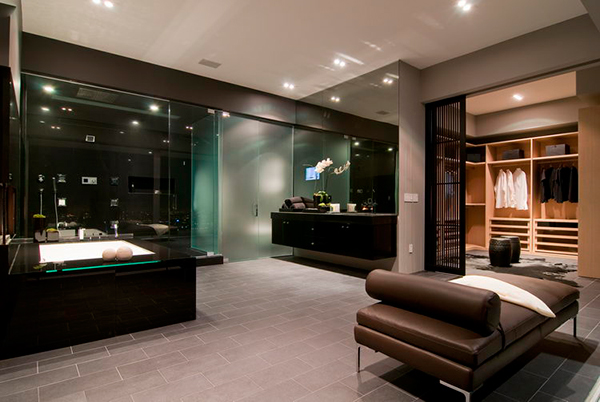 Ludwig Mies van der Rohe (March 27, 1886 - August 17, 1969) was a German - American architect. Ludwig Mies, along with Walter Gropius and Le Corbusier is widely regarded as one of the pioneering masters of modern architecture. He created an influential Twentieth Century architectural style, stated with extreme clarity and simplicity. His mature buildings made use of modern materials such as industrial steel and plate glass to define austere but elegant spaces. Mies worked in his father's stone - carving shop and at several local design firms before he moved to Berlin joining the office of interior designer Bruno Paul. He began his architectural career as an apprentice at the studio of Peter Behrens from 1908 - 1912, where he was exposed to the current design theories and to progressive German culture. Mies renamed himself as part of his rapid transformation from a tradesman's son to an architect working with Berlin's cultural elite. He began his independent professional career designing upper class homes in traditional Germanic domestic styles. While continuing his traditional design practice, Mies began to work with the progressive design magazine G, started in July 1923. He designed modern furniture pieces using new industrial technologies that have become popular classics, such as the Barcelona chair and table, and the Brno chair. His furniture is known for fine craftsmanship, a mix of traditional luxurious fabrics like leather combined with modern chrome frames, and a distinct separation of the supporting structure and the supported surfaces, often employing cantilevers to enhance the feeling of lightness created by delicate structural frames. He collaborated closely with interior designer and companion Lilly Reich. Opportunities for commissions dwindled with the worldwide depression after 1929. In the early 1930s, Mies served briefly as the last Director of the faltering Bauhaus, at the request of his friend and competitor Walter Gropius. When the refugee from the heavy-handed and constricting order of the Nazi government arrived in the United States after 30 years of practice in Germany, his reputation as a pioneer of modern architecture was already established by American promoters of the international style.
Ludwig Mies van der Rohe (March 27, 1886 - August 17, 1969) was a German - American architect. Ludwig Mies, along with Walter Gropius and Le Corbusier is widely regarded as one of the pioneering masters of modern architecture. He created an influential Twentieth Century architectural style, stated with extreme clarity and simplicity. His mature buildings made use of modern materials such as industrial steel and plate glass to define austere but elegant spaces. Mies worked in his father's stone - carving shop and at several local design firms before he moved to Berlin joining the office of interior designer Bruno Paul. He began his architectural career as an apprentice at the studio of Peter Behrens from 1908 - 1912, where he was exposed to the current design theories and to progressive German culture. Mies renamed himself as part of his rapid transformation from a tradesman's son to an architect working with Berlin's cultural elite. He began his independent professional career designing upper class homes in traditional Germanic domestic styles. While continuing his traditional design practice, Mies began to work with the progressive design magazine G, started in July 1923. He designed modern furniture pieces using new industrial technologies that have become popular classics, such as the Barcelona chair and table, and the Brno chair. His furniture is known for fine craftsmanship, a mix of traditional luxurious fabrics like leather combined with modern chrome frames, and a distinct separation of the supporting structure and the supported surfaces, often employing cantilevers to enhance the feeling of lightness created by delicate structural frames. He collaborated closely with interior designer and companion Lilly Reich. Opportunities for commissions dwindled with the worldwide depression after 1929. In the early 1930s, Mies served briefly as the last Director of the faltering Bauhaus, at the request of his friend and competitor Walter Gropius. When the refugee from the heavy-handed and constricting order of the Nazi government arrived in the United States after 30 years of practice in Germany, his reputation as a pioneer of modern architecture was already established by American promoters of the international style.
BARCELONA COLLECTION
KREFELD COLLECTION



-
Krefeld sofa, lounge chair & ottoman


-
Krefeld coffee table & side table
 Ludwig Mies van der Rohe (March 27, 1886 - August 17, 1969) was a German - American architect. Ludwig Mies, along with Walter Gropius and Le Corbusier is widely regarded as one of the pioneering masters of modern architecture. He created an influential Twentieth Century architectural style, stated with extreme clarity and simplicity. His mature buildings made use of modern materials such as industrial steel and plate glass to define austere but elegant spaces. Mies worked in his father's stone - carving shop and at several local design firms before he moved to Berlin joining the office of interior designer Bruno Paul. He began his architectural career as an apprentice at the studio of Peter Behrens from 1908 - 1912, where he was exposed to the current design theories and to progressive German culture. Mies renamed himself as part of his rapid transformation from a tradesman's son to an architect working with Berlin's cultural elite. He began his independent professional career designing upper class homes in traditional Germanic domestic styles. While continuing his traditional design practice, Mies began to work with the progressive design magazine G, started in July 1923. He designed modern furniture pieces using new industrial technologies that have become popular classics, such as the Barcelona chair and table, and the Brno chair. His furniture is known for fine craftsmanship, a mix of traditional luxurious fabrics like leather combined with modern chrome frames, and a distinct separation of the supporting structure and the supported surfaces, often employing cantilevers to enhance the feeling of lightness created by delicate structural frames. He collaborated closely with interior designer and companion Lilly Reich. Opportunities for commissions dwindled with the worldwide depression after 1929. In the early 1930s, Mies served briefly as the last Director of the faltering Bauhaus, at the request of his friend and competitor Walter Gropius. When the refugee from the heavy-handed and constricting order of the Nazi government arrived in the United States after 30 years of practice in Germany, his reputation as a pioneer of modern architecture was already established by American promoters of the international style.
Ludwig Mies van der Rohe (March 27, 1886 - August 17, 1969) was a German - American architect. Ludwig Mies, along with Walter Gropius and Le Corbusier is widely regarded as one of the pioneering masters of modern architecture. He created an influential Twentieth Century architectural style, stated with extreme clarity and simplicity. His mature buildings made use of modern materials such as industrial steel and plate glass to define austere but elegant spaces. Mies worked in his father's stone - carving shop and at several local design firms before he moved to Berlin joining the office of interior designer Bruno Paul. He began his architectural career as an apprentice at the studio of Peter Behrens from 1908 - 1912, where he was exposed to the current design theories and to progressive German culture. Mies renamed himself as part of his rapid transformation from a tradesman's son to an architect working with Berlin's cultural elite. He began his independent professional career designing upper class homes in traditional Germanic domestic styles. While continuing his traditional design practice, Mies began to work with the progressive design magazine G, started in July 1923. He designed modern furniture pieces using new industrial technologies that have become popular classics, such as the Barcelona chair and table, and the Brno chair. His furniture is known for fine craftsmanship, a mix of traditional luxurious fabrics like leather combined with modern chrome frames, and a distinct separation of the supporting structure and the supported surfaces, often employing cantilevers to enhance the feeling of lightness created by delicate structural frames. He collaborated closely with interior designer and companion Lilly Reich. Opportunities for commissions dwindled with the worldwide depression after 1929. In the early 1930s, Mies served briefly as the last Director of the faltering Bauhaus, at the request of his friend and competitor Walter Gropius. When the refugee from the heavy-handed and constricting order of the Nazi government arrived in the United States after 30 years of practice in Germany, his reputation as a pioneer of modern architecture was already established by American promoters of the international style.

































